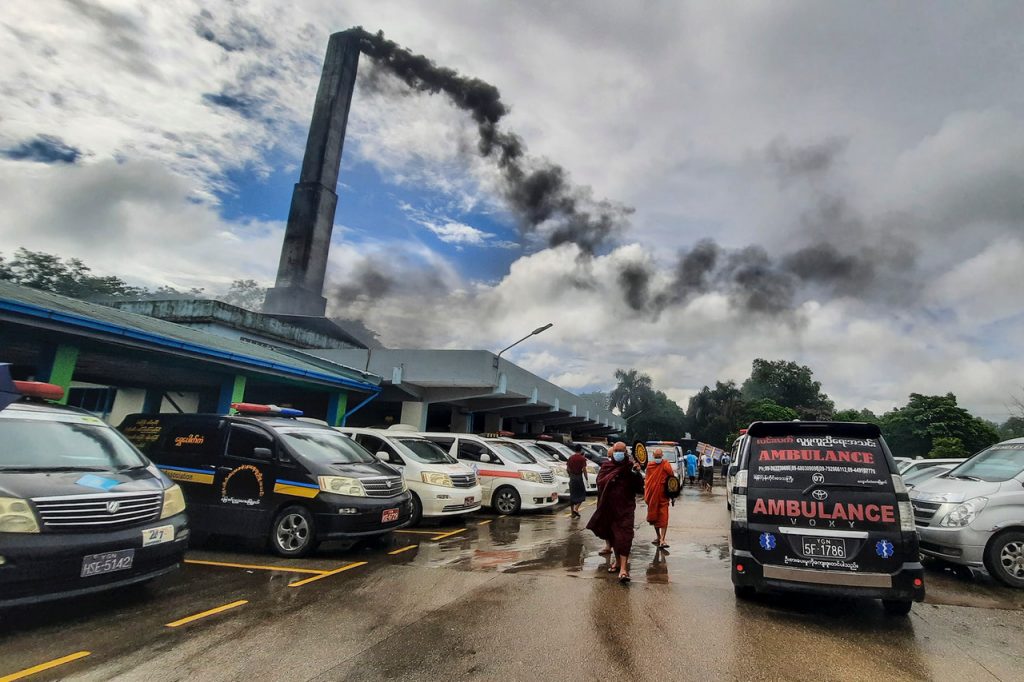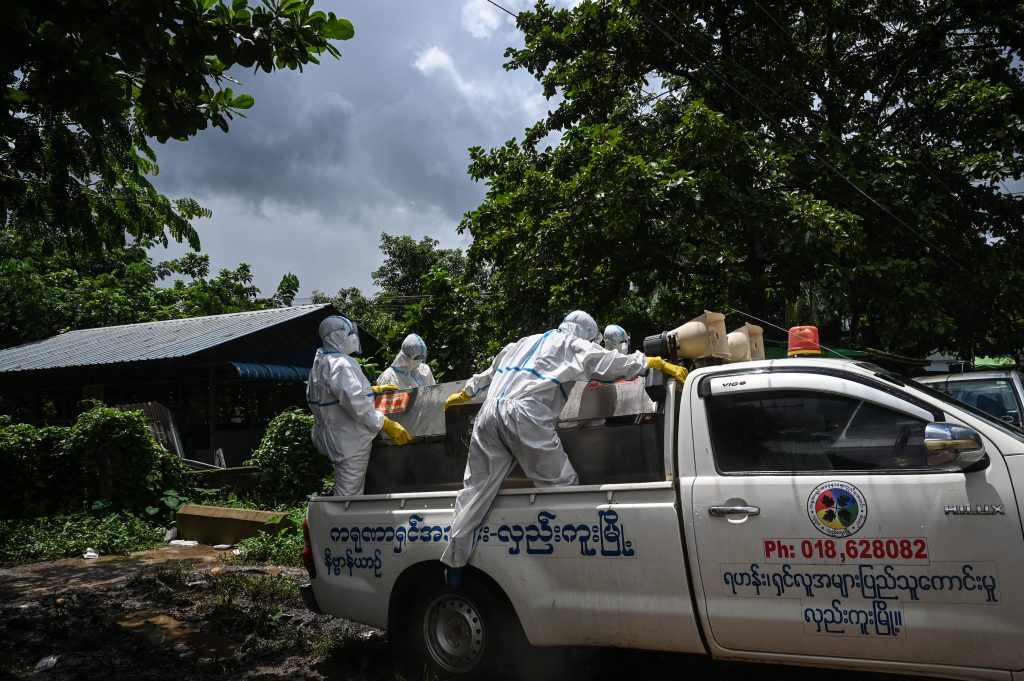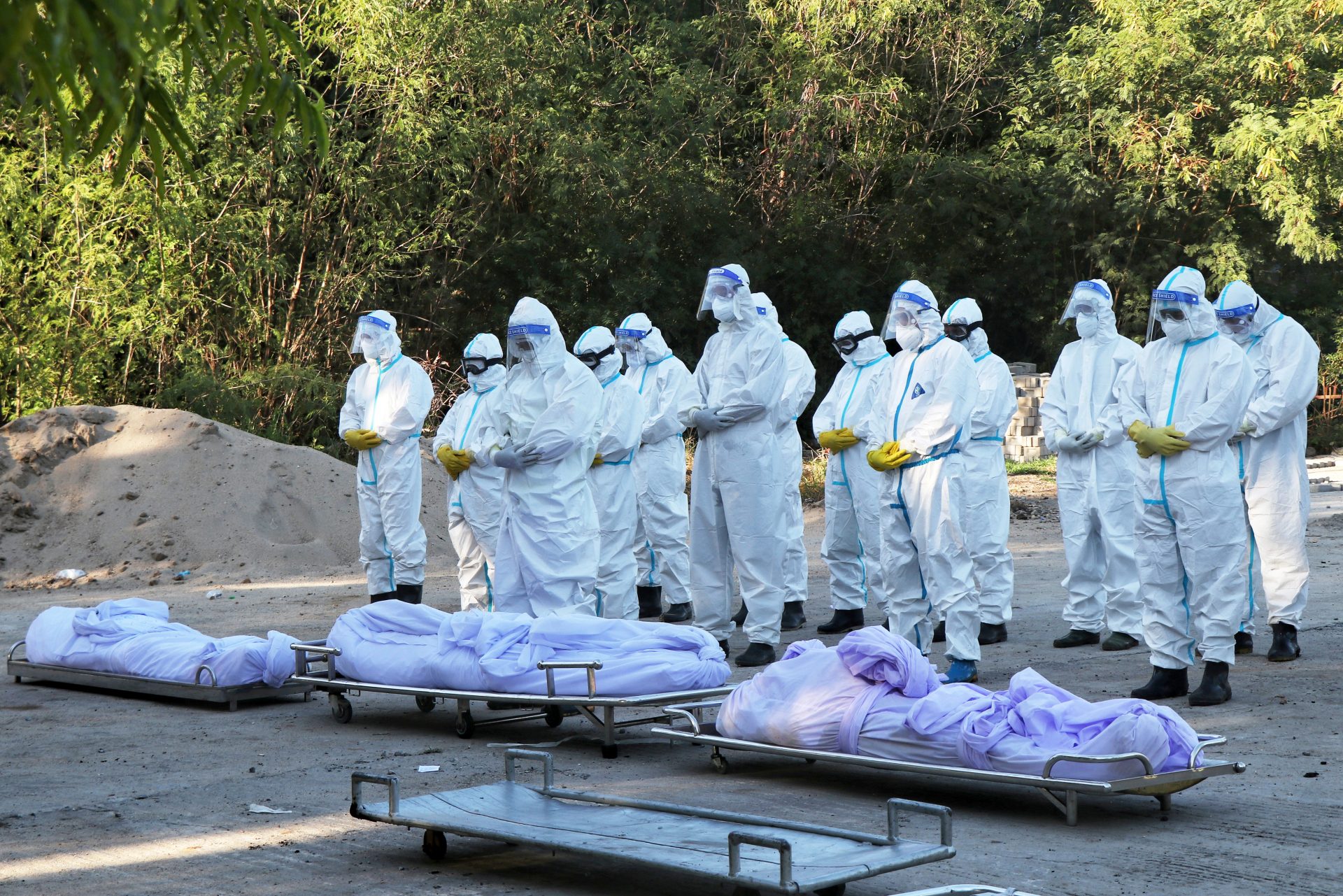As the death toll mounts from an outbreak of COVID-19 infections that Myanmar’s junta has done little to control, volunteers in the country’s largest city Yangon have stepped into the breach to provide funeral services to the poor and are putting their lives at risk to do so.
Efforts to control the spread of the coronavirus in Myanmar were dealt a serious blow when the military seized power from Aung San Suu Kyi’s democratically elected National League for Democracy (NLD) government on Feb. 1. The country’s healthcare system is now at the brink of collapse due to a poorly managed third wave of COVID-19 that has killed nearly 7,000 people since the start of July.
The official number of infections rose Wednesday to a total of 311,067 since Myanmar’s first recorded case in March last year, with at least 10,373 dead, although the actual numbers are believed to be substantially higher, based on reports by aid groups.
The country’s public hospitals are operating at maximum capacity and have been turning away all but the most seriously ill. Other patients are being forced to settle for treatment at home amid shortages of basic medical necessities, including oxygen supplies critical to mitigating hypoxia, when oxygen fails to reach bodily tissues.
Tens of thousands of people, including many healthcare professionals, have left their jobs to join a nationwide Civil Disobedience Movement (CDM) in opposition to junta rule. Many have faced arrest for voicing criticism of the regime.
One of the groups that has picked up the slack amid Myanmar’s political upheaval is the Metta Thingaha Free Funeral Aid Association in Yangon’s Dagon Myothit (East) Township, run by founder Min Din and around 20 volunteers. The group has been providing daily free transportation for bodies to area cemeteries using its five hearses since early July, when COVID deaths began to spike.
Min Din told RFA’s Myanmar Service that prior to July 11, Metta Thingaha had carried only two or three bodies of patients who had died of COVID-19 each day for households in a handful of neighborhoods.
“But the third wave of COVID has been the deadliest,” he said.
“Since July 11, we have had to carry between 20 and 30 bodies a day. As more and more deaths occurred and the number of corpses increased, we had to begin loading three or four in one vehicle.”
That number peaked on July 21, he said, when the group transported 34 bodies in a single day.
While the death toll has dropped slightly, Metta Thingaha is no less busy. Min Din said obtaining certificates to deliver bodies to cemeteries is one of the group’s biggest challenges, in addition to the backlog of bodies to be buried.
“Even with the proper papers, the bodies are not allowed to be laid to rest right away at the cemetery,” he said, noting that volunteers are often required to wait between 90 minutes and two hours for their turn.

At the peak of COVID deaths, Min Din said, Metta Thingaha volunteers took care of bodies left unattended at Yayway Cemetery in Yangon’s North Okkalapa township for an entire day without a break.
A volunteer named Nay Myo Aung told RFA that he rests only when he falls ill, but then quickly resumes work without even being tested for COVID-19.
“I wear PPE (personal protective equipment) for almost the entire day,” he said.
“You can’t breathe easily while wearing it and the dead bodies we transport don’t smell good. Sometimes, they have already been dead for two or three days, making it very difficult for us to breathe.”
Nay Myo Aung said that at one point, he and nearly half of his fellow volunteers became sick, but carried on with their work, even while feverish or after losing their sense of smell—symptoms commonly associated with COVID-19 infection.
“When we got better, we’d get up and do it again. Positive or negative—we didn’t care,” he said.
Barely keeping pace
Another young volunteer from Metta Thingaha named Zaw Moe Naing said he was concerned about potentially spreading the coronavirus to his family, but said the work is important to him as a member of the community.
“Whether we contract the virus or not, we’ve got to help others who are suffering,” he said. “Some of my fellow volunteers do not even want to go near their parents, who are elderly.”
Zaw Moe Naing said he had transported as many as six bodies at a time to the cemetery for burial and expects that demand for his services may grow, as the outbreak continues unchecked.
Last week, the junta said it would build 10 new crematoriums in Yangon that can handle a total of more than 3,000 bodies each day, but the announcement drew criticism from members of the public, who say authorities should be spending money to control the spread of the coronavirus, rather than on measures to deal with the dead.
Min Din said the regime is barely keeping pace with the health crisis, calling the move “the wrong medicine for the wound.”
“We already see about 3,000 cremations a day at the cemeteries,” he said, adding that if the outbreak becomes worse, “the number of deaths might double.”
“Frankly speaking, there are only so many people left to die.”
According to Min Din, aid groups had presented a plan for screening infected patients to district authorities during the first week of July, before the death toll began to rise, but the measures were never implemented because higher-level officials never gave their authorization to do so.
“The authorities are wrong [about how they are dealing with the problem],” he said. “And in the current political situation, where people cannot act freely, there will be more mismanagement.”

Vaccinations needed
Meanwhile, volunteers urgently need to be vaccinated against the highly contagious coronavirus because of their regular proximity to patients with COVID-19, as well as those who have died from the disease, Min Din said.
Dr. Khin Khin Gyi, director of the Emerging Infectious Diseases Epidemiology Unit for Myanmar’s Ministry of Health and Sports, recently told the media that volunteers would be prioritized for vaccine distribution after health workers and the elderly, noting that they “play a significant role in immunization, as well as the transportation of COVID-19 patients, both living and dead.”
But Min Din told RFA he had yet to receive an offer from the junta to inoculate Metta Thingaha volunteers.
“Our volunteers are on the ground but, so far, no offer has been made and no one has been notified,” he said.
“We haven’t heard a word on this. They might have a plan. We don’t know.”
Copyright © 1998-2020, RFA. Used with the permission of Radio Free Asia, 2025 M St. NW, Suite 300, Washington DC 20036. For any commercial use of RFA content please send an email to: [email protected].







